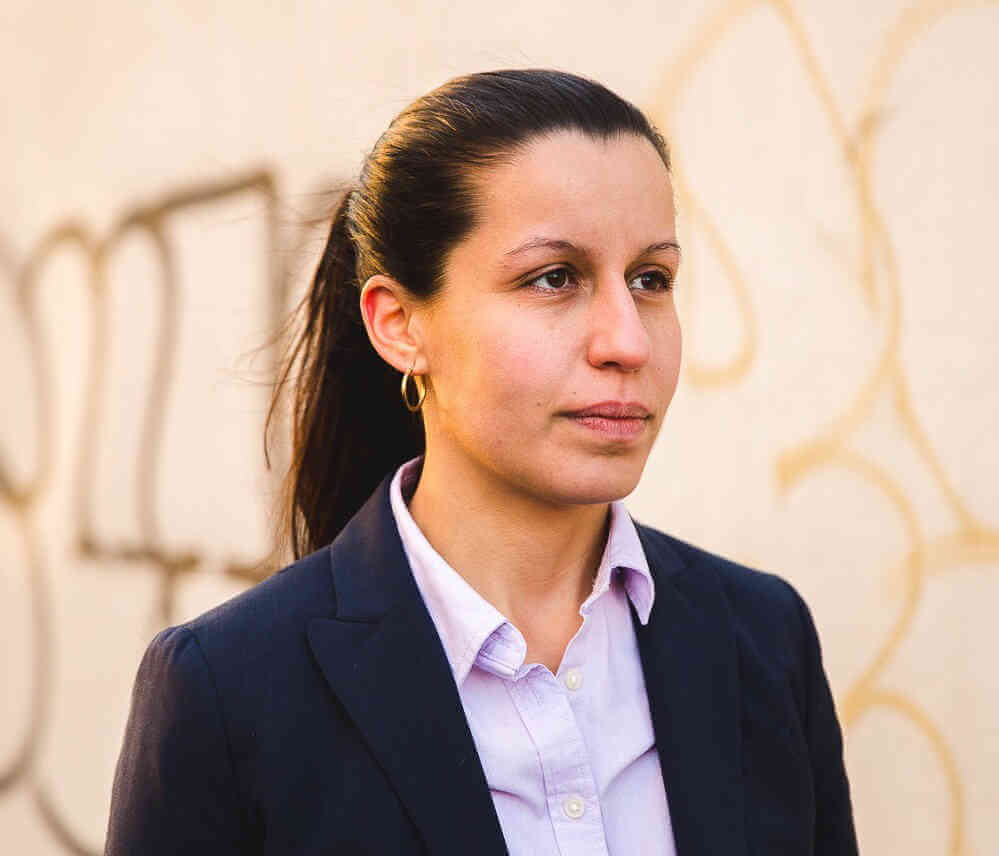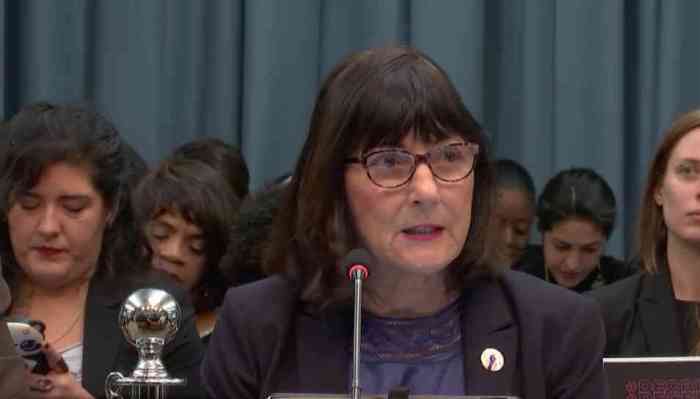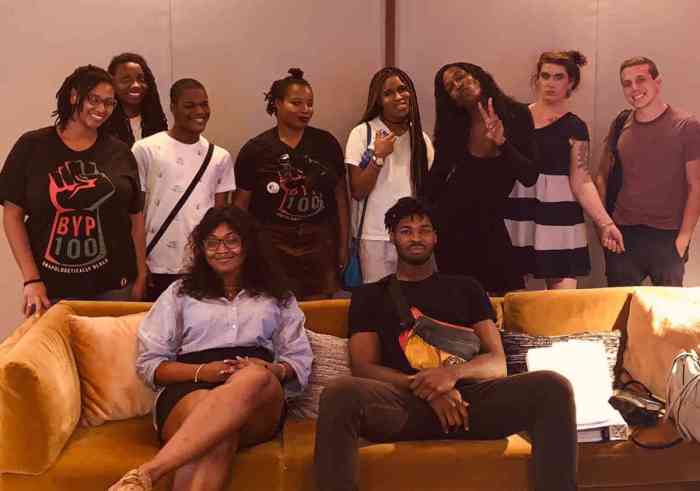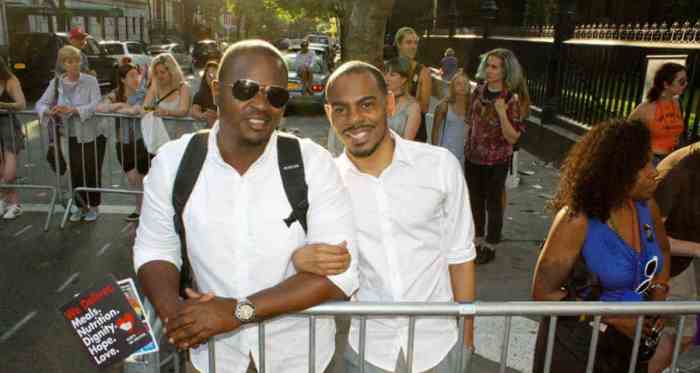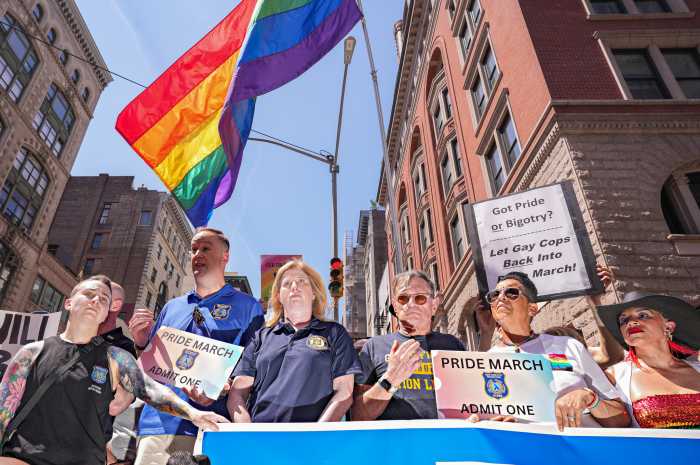Queens district attorney candidate Tiffany Cabán stopped at one point during a recent interview with Gay City News to make it clear she prefers to speak about the LGBTQ community in the first person because, in her words, “It’s my community.”
Cabán’s identity as a queer Latina woman has helped shape her career as a public defender and her understanding of other marginalized groups facing tough hurdles in the criminal justice system, and she is now vying to channel her insight toward a broader effort to shake up the political and legal establishment in the borough.
Cabán, who grew up in Queens, admitted she “never thought” she would be running for an office with a tough-on-crime reputation. But a burning desire to eradicate the systemic problems she’s witnessed was part of the driving force behind her decision to run, and she ultimately wants to flip the script on the way Queens residents think of prosecution in their borough.
“When I walk through the halls of the courthouse, people say, ‘You’re the good guy!,’” Cabán said, referring to her work as a public defender. “You have to ask why that is. Why am I on the good side?”
The 31-year-old Cabán is facing formidable foes in the looming June 25 primary race, including Queens Borough President Melinda Katz and City Councilmember Rory Lancman, both of whom have spent more than a decade serving as elected officials in various capacities. But Cabán has managed to stand out — and pile up endorsements — in part by touting progressive stances historically unheard of among district attorneys in the nation’s largest city, let alone in a borough where current DA Richard Brown will have reigned for more than 28 years when he resigns in June. (John Ryan will serve as acting DA until Brown’s permanent successor is chosen in the November 5 general election.)
Cabán felt emboldened to run for the office when she saw local political upstarts like Congressmember Alexandria Ocasio-Cortez find success when running against entrenched political leaders who appeared destined to cruise to re-election.
Cabán’s slate of progressive stances include her support for the decriminalization of sex work — though she struggled to articulate during this interview whether it should be fully legalized — and she further broke with many district attorneys when she said it is not necessary to request cash bail in many cases, another issue that exposes the class divide in the criminal justice system, with some defendants easily able to afford it but others remaining behind bars for lengthy periods without having been convicted of anything. She has seen firsthand the impact of this issue in a meeting with a transgender client ahead of her court hearing.
“She couldn’t afford her bail,” Cabán said, recalling that her client was thrown into a holding area with men as she awaited a hearing. “I sat down across the bars from my client and saw a group of men standing behind her — and she was growing facial hair for the first time in a long time.”
That her client was growing facial hair — a clear sign of medical mistreatment in the withholding of needed hormones — and forced to be housed with men was a reflection of the inhumane conditions trans people can endure while incarcerated.
Cabán noted that Manhattan Detention Center is supposed to have special housing for transgender women. Yet, only some trans women are placed there.
“They can hold 50-60 people there, but at a given time there are 20-25 people in that unit and everybody else that identifies as trans is placed into solitary,” she said. “To be placed into solitary and told this is for your safety… nobody should be in solitary.”
Cabán wondered aloud why she is “not seeing the overwhelming outrage” about the community being disproportionately affected by the criminal justice system.
The criminal justice system has been harsh for sex workers, as well — including many who are transgender. Sex workers often fall into vulnerable positions because the law pushes them into a dark underground or police officers and clients take advantage of them. Cabán believes it is important to make sure that the criminal justice system is not stacked against people who are merely trying to make ends meet.
“Our economy doesn’t work for everybody,” she said. “There is a large number of trans Latina women who do sex work. On an everyday basis, they experience barriers in areas of housing and employment. This is work they do to survive. It’s the same with a lot of migrant workers from Asian communities working in massage parlors. Sex work is work.”
As DA, Cabán said she would decline to go after sex workers, customers, or landlords and spaces facilitating sex work. In her view, that would help allow sex workers to pursue their trade in dignity while also benefitting those coerced into the work because folks would not feel as threatened to work with law enforcement.
The issue of sex work has been injected into local and national conversations thanks to vibrant campaigns mounted by advocacy groups such as DecrimNY, which has led the effort for decriminalization here, pushing politicians to fight for their cause. That group has, however, deliberately opted to advocate for decriminalization rather than legalization, which would entail potential hurdles for sex workers having to comply with a more regulated system.
Cabán’s position on whether sex work should be outright legalized is not as clear. When she was asked about that in a questionnaire for the Jim Owles Liberal Democratic Club — an LGBTQ group that has endorsed her — she responded, “Absolutely,” and added, “As DA, my office’s policies will support the legalization and de-stigmatization of sex work.” But when asked by Gay City News about that position and how it conflicts with the stance taken by DecrimNY, Cabán did not directly indicate whether she stands for full legalization, though she definitively supports at least decriminalization. She said she would “continue conversations” on the issue.
“One thing that I’m proud of is that I am always ready and willing to sit at the table with those who are directly impacted,” Cabán said.
On another emerging criminal justice reform question, Cabán said she wouldn’t fight parole in most cases, a position taken most recently by Brooklyn DA Eric Gonzalez. Still, Cabán acknowledged that parole boards wield the final say on such decisions, with the DA playing only an advisory role.
“I think we should be taking a practical approach with every case to make sure harm doesn’t happen,” Cabán said. “One thing that people don’t recognize is that the DA can take a position that doesn’t force the parole [board] to act. Parole is independent, but as a DA, we can take the position of, ‘Hey we think this person should stay in their community.’”
Cabán’s relative obscurity in the political world — she has yet to create a Wikipedia page — will likely mean an uphill battle against well-connected competitors, but that could also work in her favor in the same way it did for the handful of State Senate candidates last year who knocked off established incumbents who were tied to the Independent Democratic Conference. She is also hoping that her unique approach means she can connect more directly with voters — even if they don’t share the same background or come from the same demographic as she does.
“For me, when I think about the fact that I am a queer Latina, that informs the way I view the world, it speaks to some of my experiences, some of the challenges that I’ve faced, and it also is about intersectionality,” Cabán explained.
As part of her goal to connect more directly with the community, Cabán said she would assign prosecutors to geographical areas, sending them into local communities to build relationships with the people who live there. She said that approach differs from the way DAs usually handle things, which in the current status quo is “the big thing that separates prosecutors from public defenders.”
Cabán voiced confidence that her style as a public defender in engaging the entire community in criminal justice dialogue —regardless of race, sexual orientation, gender identity, immigration status, belief systems, or other differences — will be a winning message down the stretch.
“There are so many people who will invalidate your experiences,” she said. “You don’t have to believe in the same thing, but you should validate us. You may have a different value set, but it is an approach you have to take in the work as a public defender: It is your job to accept and validate and understand where people are coming from.”

